 W
WMajor General Peter Maurice Arnison, is a retired Australian Army officer who served as the 23rd Governor of Queensland, in office from July 1997 until July 2003. He graduated from the Royal Military College, Duntroon in 1962, and served as Land Commander Australia from 1994 until he retired from the Australian Army in 1996.
 W
WBrigadier Robert Neville Atkinson,, FAMA is an Australian orthopaedic surgeon and retired senior officer of the Royal Australian Army Medical Corps, best known for his contributions to trauma and military surgery.
 W
WGeneral John Stuart Baker was a senior Australian Army officer. Entering the Royal Military College, Duntroon in 1954, his career culminated with his appointment as Chief of the Defence Force from 1995 to 1998, the most senior position in the Australian Defence Force. Baker also served as the inaugural Director of the Defence Intelligence Organisation from 1990 to 1992, Vice Chief of the Defence Force from 1992 to 1995, and was author of the highly influential 1988 "Baker Report".
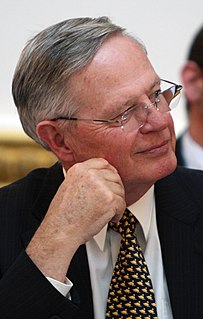 W
WAdmiral Christopher Alexander Barrie, is a retired senior officer of the Royal Australian Navy, who served as Chief of the Defence Force from 4 July 1998 to 3 July 2002.
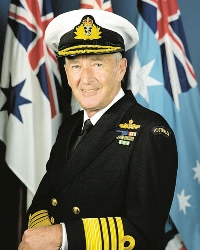 W
WAdmiral Alan Lee Beaumont, was a senior officer in the Royal Australian Navy, whose career culminated with his appointment as Chief of the Defence Force from 1993 to 1995.
 W
WGeneral Sir Phillip Harvey Bennett, is a retired senior officer of the Australian Army who served as Chief of the Australian Defence Force from 1984 to 1987, and later as Governor of Tasmania from 1987 to 1995.
 W
WCommander Graham James Bond was an officer in the Royal Australian Navy. He was best known for having discovered and charted a new deep-water shipping channel through the Great Barrier Reef, the Hydrographers Passage, which was 250 miles shorter than the previous route.
 W
WLieutenant General Henry John Coates, was a senior officer in the Australian Army who served as Chief of the General Staff from 1990 to 1992. After retiring from the army, he became an author and a visiting fellow at the Australian Defence Force Academy branch of the University of New South Wales, pursuing aspects of Australia's military history.
 W
WGeneral Sir Peter John Cosgrove, is a retired senior Australian Army officer who served as the 26th Governor-General of Australia, in office from 2014 to 2019.
 W
WBrigadier Adrian Stuart d'Hagé, is a former Australian military officer and a novelist.
 W
WVance Drummond, was a New Zealand–born Australian pilot who fought in the Korean and Vietnam Wars. He initially saw service in the New Zealand military, but joined the Royal Australian Air Force in 1949 and graduated as a sergeant pilot in 1951. Posted to No. 77 Squadron in Korea, he flew Gloster Meteor jet fighters and earned the US Air Medal for his combat skills. He was shot down by a Mikoyan-Gurevich MiG-15 in December 1951 and imprisoned for almost two years. After returning to Australia he converted to CAC Sabre jets and in December 1961 became a flight commander with No. 75 Squadron; he subsequently led the squadron's Black Diamonds aerobatic team, and was awarded the Air Force Cross in 1965.
 W
WLieutenant General Sir Donald Beaumont Dunstan was an Australian Army officer who was Governor of South Australia from 23 April 1982 until 5 February 1991. A career officer, after joining the Army in 1940 during the Second World War, Dunstan graduated from the Royal Military College, Duntroon in 1942 and served as an infantry officer, seeing combat against the Japanese during the Bougainville Campaign in 1945. After the war, he served in a variety of appointments, including as commander of the 1st Australian Task Force during the Vietnam War. From 1977 to 1982 he held the appointment of Chief of the General Staff, before retiring from the Army having overseen a large-scale re-organisation. Afterwards, he became the longest-serving governor of South Australia. He died in 2011, at the age of 88.
 W
WGraham John Edwards AM is an Australian soldier, veteran's advocate and Labor Party member who represented the electorate of Cowan in the Australian House of Representatives from 1998 to 2007.
 W
WTimothy Andrew Fischer was an Australian politician and diplomat who served as leader of the National Party from 1990 to 1999. He was Deputy Prime Minister in the Howard Government from 1996 to 1999.
 W
WMajor General Stephen Newman "Steve" Gower, is a retired Australian Army officer and former director of the Australian War Memorial (AWM). During his time in the Army he saw combat as an artillery forward observer during the Vietnam War in 1966 and 1967. He is also the author of the books Guns of the Regiment (1981) and Options for an Australian Defence Technological Strategy (1982).
 W
WMajor General Stuart Clarence Graham, was a senior officer in the Australian Army, seeing service during the Second World War, the Occupation of Japan and the Vietnam War. Born in Ulmarra, New South Wales, he graduated from the Royal Military College, Duntroon in 1940. Graham subsequently held a series of regimental and staff appointments, serving in a number of infantry and armoured units during the Second World War. In the post-war period he served in the British Commonwealth Occupation Force in Japan, and held a number of staff and command positions in the Armoured Corps. In the late 1950s he was posted to Army Headquarters, and later served as Director of Military Intelligence. Commanding the 1st Australian Task Force during fighting in South Vietnam during 1967, he was responsible for establishing the controversial barrier minefield from Dat Do to the coast. Later, Graham filled a range of senior command, staff and diplomatic roles in Australia and overseas, including the position of Deputy Chief of the General Staff (DCGS), before retiring in 1977. He died in 1996.
 W
WAdmiral Michael Wyndham "Mike" Hudson was a senior officer in the Royal Australian Navy (RAN), particularly notable for playing an important role in the introduction of the Collins class submarines and Anzac Class frigates, and establishing two-ocean basing for ships of the RAN during his tenure as Chief of Naval Staff from 1985 to 1991.
 W
WMajor General Ronald Laurence Hughes, was a senior infantry officer in the Australian Army, seeing service during the Second World War, the Korean War and the Vietnam War. Joining the Australian Army in 1937, after graduating from the Royal Military College, Duntroon in 1939 he served in New Guinea and Borneo during the Second World War. He commanded the 3rd Battalion, Royal Australian Regiment during the static phase of the war in Korea in 1952–1953. Later, he commanded the 1st Australian Task Force in South Vietnam in 1967–68, during some of the heaviest fighting of the war experienced by the Australians. He subsequently filled a number of senior command and staff positions before retiring in 1977.
 W
WBrigadier Oliver David Jackson, was a senior officer in the Australian Army, seeing service during the Second World War and the Vietnam War. After graduating from the Royal Military College, Duntroon, in 1939 he served in the Middle East and New Guinea during the Second World War. Later, he commanded the Australian Army Training Team Vietnam (AATTV) and the Australian Army Force Vietnam (AAFV) in 1965–66. In 1966, he became the first commander of 1st Australian Task Force in South Vietnam. He subsequently filled a number of senior command and staff positions before retiring in 1974. He died in 2004.
 W
WMajor General William Brian "Digger" James was an Australian soldier and military physician who served in the Australian Army during the Korean War and the Vietnam War.
 W
WMajor General Philip Michael Jeffery, was a senior Australian Army officer and vice-regal representative. He was the 28th Governor of Western Australia from 1993 to 2000, and the 24th Governor-General of Australia, serving from 2003 to 2008.
 W
WVice Admiral Ian Warren Knox AC is a retired senior officer of the Royal Australian Navy (RAN). In a 42-year career, Knox commanded HMA Ships Torrens, Hobart and Melbourne, briefly served as Deputy Chief of Naval Staff, and was Flag Officer Commanding HM Australian Fleet from 1985 to 1987. His career culminated with his appointment as Vice Chief of the Defence Force in January 1987; a position he held until his retirement in September 1989.
 W
WGeneral Sir Arthur Leslie MacDonald, was a senior officer in the Australian Army, who served in the positions of Chief of the General Staff from 1975 to 1977, then Chief of the Defence Force Staff from 1977 to 1979; the professional head of the Australian Army and Australian Defence Force respectively.
 W
WBrigadier Denis Owen Anthony Magee was a brigadier in the Australian Army. A graduate of the Royal Military College, Duntroon, and the University of Western Australia, he served in the Second World War, Korean War and Vietnam War. He was involved in the construction of the rocket range at Woomera, the British nuclear weapon tests site at Maralinga, the Snowy Mountains Scheme, the Lavarack Barracks and the Oakey Army Aviation Centre. After retiring from the Army in 1970, he served as Director of the Sydney Cove Redevelopment Authority until 1985.
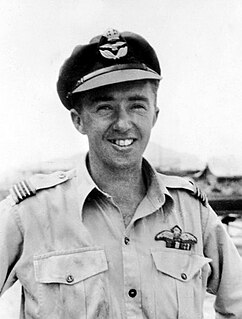 W
WAir Chief Marshal Sir Neville Patrick McNamara, was a senior commander of the Royal Australian Air Force (RAAF). He served as Chief of the Air Staff (CAS), the RAAF's highest-ranking position, from 1979 until 1982, and as Chief of the Defence Force Staff (CDFS), Australia's top military role at the time, from 1982 until 1984. He was the second RAAF officer to hold the rank of air chief marshal.
 W
WAir Marshal Sir Alister Murray Murdoch, was a senior commander in the Royal Australian Air Force (RAAF). He served as Chief of the Air Staff (CAS) from 1965 to 1969. Joining the Air Force in 1930, Murdoch trained as a seaplane pilot and participated in an Antarctic rescue mission for lost explorers in 1935. During World War II, he commanded No. 221 Squadron RAF in Europe and the Middle East, and later occupied senior positions on the staff of RAAF formations in the South West Pacific. His post-war appointments included Commandant of RAAF College from 1952 to 1953, Air Officer Commanding (AOC) Training Command from 1953 to 1955, Deputy Chief of the Air Staff from 1958 to 1959, and AOC Operational Command from 1962 to 1965.
 W
WGeorge James Odgers (1916–2008) was an Australian soldier, journalist and military historian. Odgers served in the Australian Army as a private soldier and non-commissioned officer; and later in the Royal Australian Air Force becoming a group captain. He was one of the authors of the official history of Australia in World War II, Australia in the War of 1939–1945.
 W
WKeith Payne, is an Australian recipient of the Victoria Cross, the highest decoration for gallantry "in the presence of the enemy" awarded to members of the British and Commonwealth armed forces. Payne's VC was awarded for his actions during the Vietnam War. Aged 88, he is the last living Australian recipient of the original "Imperial" Victoria Cross.
 W
WAir Commodore Peter Frank Raw, was a senior officer and pilot in the Royal Australian Air Force (RAAF). He saw combat in a heavy bomber unit in the European theatre during the later stages of World War II and as a senior officer in the Vietnam War, and served in many flying, training and administrative roles.
 W
WVice Admiral Christopher Angus Ritchie is a retired senior officer of the Royal Australian Navy, who served as Chief of Navy from 2002 to 2005.
 W
WNorman John Rowe is an Australian singer and songwriter of pop music and an actor of theatre and soap opera for which he remains best known as Douglas Fletcher in 1980s serial Sons and Daughters. As a singer he was credited for his bright and edgy tenor voice and dynamic stage presence. Many of Rowe's most successful recordings were produced by Nat Kipner and later by Pat Aulton, house producers for the Sunshine Records label. Backed by his band, The Playboys, Rowe released a string of Australian pop hits on the label that kept him at the top of the Australian charts and made him the most popular solo performer of the mid-1960s. Rowe's double-sided hit the A-side, a reworking of the Doris Day hit "Que Sera Sera" /with b-side "Shakin' All Over" was one of the most successful Australian singles of the 1960s.
 W
WRear Admiral Kevin John Scarce, is a retired Royal Australian Navy officer who was the 34th Governor of South Australia, serving from August 2007 to August 2014. He was succeeded by Hieu Van Le, who had previously been his lieutenant governor. He was Chancellor of the University of Adelaide from 2014 to 2020.
 W
WBrigadier Francis Philip "Ted" Serong, was a senior officer of the Australian Army. Born into a Roman Catholic family in 1915, Serong's opposition to communism led him to join the army, graduating from the Royal Military College, Duntroon, in 1937. During the Second World War he mainly served in training and staff roles, but saw combat against the Japanese at Wewak late in the war. In the post-war period he had a significant influence on the training of the Australian Army, which he helped re-orient to warfare in South East Asia, heading the jungle training centre at Canungra in 1955 and developing the army's counter-insurgency doctrine. He instructed the armed forces of Burma in jungle warfare in the late 1950s and was a strategic advisor to the Burmese Army from 1960 to 1962.
 W
WVice Admiral Russell Edward Shalders, is a retired admiral of the Royal Australian Navy (RAN). He served as Vice Chief of the Australian Defence Force from 2002 to 2005, and as Chief of Navy from 2005 to 2008.
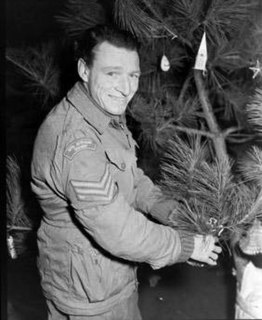 W
WRayene Stewart Simpson, was an Australian recipient of the Victoria Cross, the highest award for gallantry "in the face of the enemy" that can be awarded to members of the British and Commonwealth armed forces. Simpson received his award for actions in Kon Tum Province, South Vietnam on 6 May 1969.
 W
WLieutenant Colonel Harry Arthur Smith SG, MC is a former senior officer in the Australian Army, seeing service during the Malayan Emergency and the Vietnam War. He was Officer Commanding D Company, 6th Battalion, Royal Australian Regiment during the Battle of Long Tan on 18 August 1966.
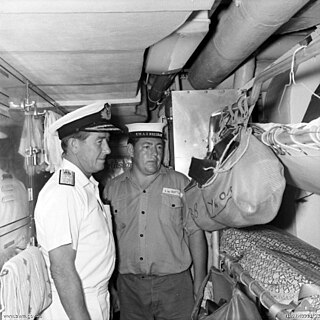 W
WVice Admiral Sir Hugh David Stevenson was a senior officer of the Royal Australian Navy, serving as Chief of Naval Staff from 1973 to 1976.
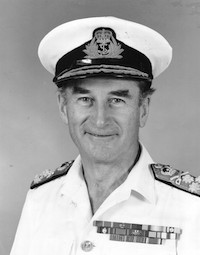 W
WAdmiral Sir Anthony Monckton Synnot, was a senior officer in the Royal Australian Navy, who served as Chief of the Defence Force Staff from 1979 to 1982.
 W
WBrigadier Stuart Paul Weir, was a senior officer in the Australian Army, seeing service during the Second World War, Korean War, the Malayan Emergency and the Vietnam War. He subsequently commanded the 1st Australian Task Force in South Vietnam in 1969–70.
 W
WGeneral Sir John Gordon Noel Wilton, was a senior commander in the Australian Army. He served as Chief of the General Staff (CGS), the Army's professional head, from 1963 until 1966, and as Chairman of the Chiefs of Staff Committee (CCOSC), forerunner of the role of Australia's Chief of the Defence Force, from 1966 until 1970. His eight-year tenure as senior officer of first the Army and then the Australian military spanned almost the entire period of the nation's involvement in the Vietnam War.